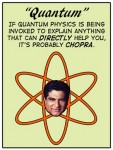We need an appropriate noun in there…I just wish “atheist” wasn’t one of them. After his awful run-in with Martin Hughes in which TJ Kirk, the “amazing” atheist, revealed just how mind-bogglingly and obliviously racist he is, you can guess what happened next.
A. He had an epiphany and realized that lecturing a black man on the nature of racism was absurd?
B. He took the rebuke seriously and is in the process of rethinking his errors?
C. He doubled down and declared that black people in America are all professional victims?
What’s your guess?
The correct answer is C, D, E, F, G, H, etc., in increasing order of patent nastiness. Kirk had a long heartfelt discussion with Hughes, and it just got worse and worse and worse.
This is exactly why we have to dig a deep chasm in the heart of atheism, detonate a few nukes inside it to widen it, and fill it with molten lava to keep those shitbags on their side.





